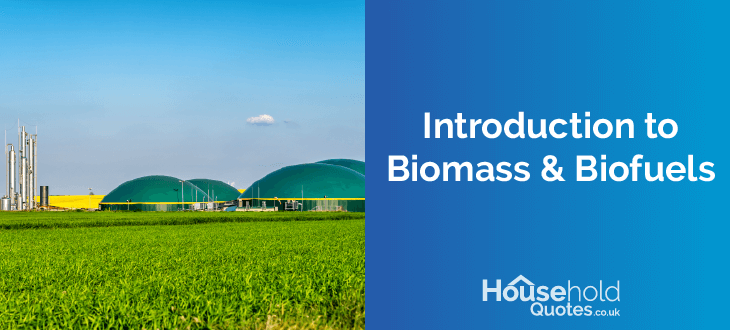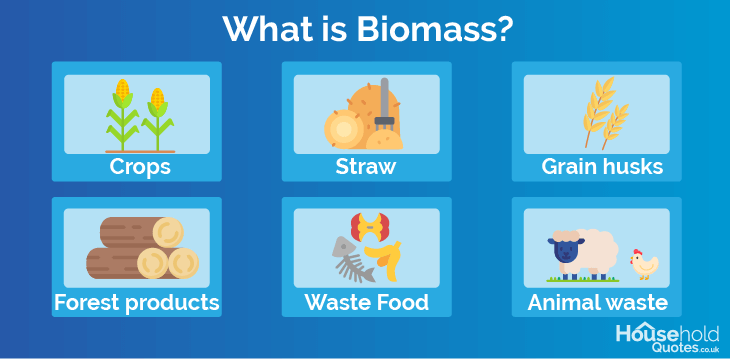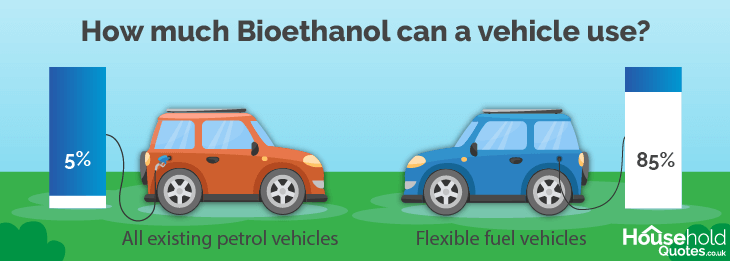Answer these simple questions and we will find you the BEST prices
Which type of solar quotes do you need?
It only takes 30 seconds
100% free with no obligation

Get up to 3 quotes by filling in only 1 quick form

Compare quotes and find yourself the best deal

Increase the value of your home by installing a new boiler
- Householdquotes.co.uk
- Boilers
- Biomass Boilers
Biomass Boilers: Everything You Need To Know


Given the volatility in energy prices and ongoing concerns about environmental sustainability, it's unsurprising that many homeowners are exploring alternative ways of heating their homes. Installing a biomass boiler is one way to reduce your long-term energy bills and your environmental impact, as these boilers use non-fossil fuels from more sustainable sources in order to heat your home.
In this article, we look at:
- How much biomass boilers cost
- What affects the cost of installing a biomass boiler
- How to save money on your biomass boiler installation
- The advantages and disadvantages of using a biomass boiler
- How to find a professional to fit and install one
If you're wanting to switch your energy type to something more sustainable, keep reading to find out how you can integrate biomass power into your home in the most cost-effective way.
What is Biomass?
"Biomass" typically describes organic matter such as timber and crops used for combustion to produce heat and power. Various agricultural by-products are also categorised as biomass.

Biomass is considered sustainable and mostly carbon neutral because the carbon released during combustion is counterbalanced by the carbon absorbed in the organic matter during its lifetime.
Achieving genuine carbon neutrality entails using plants or trees as fuel in a sustainable manner, coupled with replanting, creating an ongoing cycle of carbon absorption.
Biofuels and Biogas
Biofuels and Biogas refer to fuels derived from Biomass, including agricultural and domestic waste, and by anaerobic digestion of sewage. These fuels, such as Biomethane, Bioethanol, Biodiesel, and Biobutanol, can be used for heat and power, running vehicles, or powering fuel cells.
Common Biomass crops for biofuel conversion include oil seed rape, flax seed, wheat, soybeans, and corn. Existing petrol vehicles can run on a blend containing 5% bioethanol, while flexible fuel vehicles can use blends of up to 85% bioethanol.

Biogas, a (biofuel) gas produced through anaerobic digestion, is derived from organic matter like manure, sewage sludge, municipal solid waste, and agricultural slurry. It primarily consists of methane and carbon dioxide.

How Much Does a Biomass Boiler Cost?
The cost of installing a biomass boiler depends in part on the type of fuel you plan to use, and how the fuel is fed into the boiler.
The table below explains the estimated cost of different biomass heating systems:
As shown in the table above, biomass log boilers can cost anywhere from £10,000 to £15,000. In most cases, installing a log-fuelled boiler is a straightforward process and should take just one or two days.
If you plan to use wood chips, the cost varies depending on whether you want to feed the woodchips into the boiler, or whether you prefer an automatic system. The cost of manually-fed wood chip boilers ranges from approximately £14,000 to £16,000.
If your budget allows, an automatically-fed wood chip boiler typically costs between £10,000 to £20,000. Both variants take between one and two days to install.
Pellet biomass boilers are a sustainable and efficient way to heat your home. If you don't mind occasionally topping up an auger or hopper, you can purchase a manually-fed pellet boiler for £15,000 to £25,000.
As you might expect, biomass boilers with an automatic pellet feeder are more expensive and could cost you as much as £20,000 to £35,000.
As with the other types of biomass boilers, the pellet versions usually take between one and two days to install.
In comparison, the best boiler for a 3 bedroom house will cost around £1,100 to £2,000. While this price disparity may seem very high, the savings on fuel costs can make it worthwhile in the long run. Additionally, you can mitigate the costs with the help of grants.
Are you ready to switch your heating to biomass? HouseholdQuotes can help you find the right boiler installer.
Click the button below to compare quotes from multiple tradespeople near you, and potentially save money on your new biomass boiler:
Comparing Quotes Could Save You Up To 40%:
Fill in the form in just 1 minute
What Affects the Cost of a Biomass Boiler?
As we saw above, biomass boiler costs can vary quite considerably. In this section, we take a more detailed look at the factors that influence the overall cost of installing a biomass boiler.
The Size of Your Home
Unsurprisingly, the size of your home has a direct impact on the overall cost of the biomass boiler you need. This is because you'll need a more powerful boiler to effectively heat your home.
The size of your home can also affect the overall cost of running your biomass boiler. In particular, you may need to run your boiler for slightly longer than average in order for every room in your house to reach the desired temperature.
Boiler Output and Your Choice of Design
Biomass boiler costs also depend on the output and design of the boiler you choose.
If you're going to invest in a biomass boiler, it makes sense to choose a model that is powerful enough to effectively heat your home—whether it's a 2-bedroom bungalow or a sprawling estate.
However, the higher the output of your boiler, the more expensive it's likely to be.
To determine what output you need for your home, you need to consider the size of your home and your energy consumption. Domestic biomass boilers usually range in output from 15 to 56 kilowatts (kW). A 15 kW biomass boiler should comfortably heat a one- or two-bedroom home.
The cost of your biomass boiler also depends on the design.
As shown in the price comparison table above, biomass boilers can be manually fed or automatically fed. Whilst log biomass boilers are always manually fed, wood chip or pellet boilers have both manual and automatic feeding options.
Automatically-fed boilers can be fed through an integrated hopper or auger (which you must top up yourself using bagged pellets or wood chips), or through a separate aboveground or below-ground storage unit (which allows you to buy bulk quantities of pellets or wood chips).
In terms of size, pellet boilers are generally more compact than wood chip boilers. Wood chip boilers are often bigger than pellet boilers due to the bulky auger which feeds the chips into the boiler.
Further to these options, there are also pellet stoves, which are among the more affordable choices for biomass heating, and are especially suited to smaller homes.
Your Choice of Fuel
Before purchasing a biomass boiler, it's a good idea to consider fuel costs. Below, we look at some of the more common types of biomass fuel, as well as newer fuels such as miscanthus and various grains.
Logs
Logs are among the most affordable biomass fuels. They have a calorific value of approximately 4.1 kWh per kilogram, which is higher than wood chips but lower than wood pellets. This makes logs a reasonably efficient source of biomass fuel.
Logs are usually sold by the cubic metre, and you should expect to pay between £100 and £300 for a pallet.
The cost varies by supplier and also depends on whether you choose softwood or hardwood logs. Softwood timber burns more quickly and is less efficient, but more affordable.
On the other hand, hardwood species – especially oak, beech, ash, and birch – are denser and therefore burn longer than softwoods like pine.
For more information on how to choose logs for your biomass boiler, see this Forestry Commission guide.
No matter what type of logs you choose, remember to factor in the cost of your time, as logs must be manually fed into the biomass boiler—usually every day.
Wood Chips
Wood chips have a calorific value of 3.5 kWh per kilogram, which means they are less efficient than logs or wood pellets.
However, they are another affordable source of biomass fuel—particularly if you live in a rural area and you can fell your own trees.
To do this, you’ll need a fuel-grade chipper to turn the timber into biomass. Alternatively, hiring a chipper generally costs around £200 per hour, plus travel time.
If you can’t source your own wood chips, buying wood chips could cost you between £80 and £150 per tonne, depending on the supplier and delivery method.
Wood Pellets
Pellets are much denser than logs and wood chips. They have a calorific value of 4.8 kWh per kilogram, which is considerably higher than wood chips or logs.
Whilst pellets are the most efficient fuel choice for biomass boilers, they are also the most expensive type of biomass fuel. Currently, wood pellets cost anywhere from £400 to £700 per tonne.
The cost varies depending on whether the pellets are tipped out onto your property (less expensive), delivered into your storage unit using a blown system, or delivered to you in bags (most expensive).
Miscanthus
Miscanthus is a type of grass (sometimes also called elephant grass) that originates in parts of Asia, southeast Africa, and the South Pacific. Currently, it's most commonly used for animal bedding in the UK.
Miscanthus is a relatively new fuel for biomass boilers. It has a calorific value of roughly 3.6 kWh per kilogram, which makes it about as efficient as wood chips.
Since miscanthus grows so quickly and is a perennial plant, it's one of the cheapest and most environmentally sustainable sources of biomass fuel.
If you have a large property, you could even consider growing your own. Planting a hectare of miscanthus costs approximately £1,200 to £1,500 and the rhizomes should remain productive for up to 20 years.
However, not all boilers are suitable for burning miscanthus.
This is because miscanthus burns at a lower temperature and produces more ash than other fuels. This can lead to unpleasant residue inside your boiler, and potentially increase your maintenance costs.
However, adding a small quantity of slaked lime to your chopped or pelleted miscanthus can increase the burning temperature and alleviate some of these challenges.
Miscanthus also naturally contains more moisture than wood fuels, so you need to ensure it remains as dry as possible.
Grains
Farmers have long known the potential value of grain as biomass fuel, but it remains new to the domestic biomass boiler market.
Multiple types of grain can be used as biomass, including barley, oats, and wheat. Barley has a calorific value of approximately 4.3 kWh per kilogram. Wheat has a calorific value of 4.6 kWh per kilogram, which makes it almost as efficient as wood pellets.
Like miscanthus, grains also burn at a lower temperature than wood and create more sticky ash that can block your boiler and prove hard to remove. Mixing your choice of grain with a small percentage of slaked lime can prevent this from occurring.

The Quantity of Fuel You Need
How much fuel you need depends in part on the size of your home, how much energy your family consumes, and the type of fuel you choose.
As a general guide, you can calculate how much fuel you need by dividing the output of your biomass boiler by 4. If you have a 15kW boiler, you’ll need approximately 3.75 tonnes of fuel per year.
This means that you could spend approximately £300 to £560 per year on wood chips, or £1,500 to £2,625 per year on pellets.
For log boilers, fuel is sold by the cubic metre, not by the tonne. To convert tonnes of fuelwood to cubic metres, simply multiply by 1.38. For a 15kW log boiler, you might spend approximately £520 to £1,550 per year on fuel depending on your choice of timber.
Whichever fuel you choose, you should only purchase biomass fuels through a supplier that is certified by HETAS or Woodsure. This ensures that your fuel is high quality, and doesn’t contain too much ash or harmful contaminants that could gum up your boiler and pollute the air.
To find a reputable supplier, search the government’s Biomass Suppliers List.
The Cost of Storing Your Fuel
In addition to the cost of buying your boiler and fuel, you'll need to sort out a way to store your fuel.
Biomass fuel must be kept dry and free of dust and pests, so a proper fuel storage system is a worthwhile investment. Fuel that is too damp won't burn efficiently (if at all) and dust and debris can gum up your boiler, leading to potentially higher maintenance and servicing costs.
Depending on which fuel you use and how much you need to store, you may be able to use an auger, a hopper, or an aboveground or below-ground storage system.
Adapting Your Existing Heating System
If you plan to switch your existing heating system to a biomass boiler, you may need to make certain adjustments.
For example, if you don't currently have a hot water cylinder, you may need to buy one so you don't have to wait for hot water. This can cost between £850 and £3,500 depending on brand and size.
It may also be necessary for you to have new radiators and pipework installed—something your heating specialist will be able to advise you on.
Maintenance and Servicing Costs
Burning biomass logs, wood chips, or pellets always creates some ash, which must be emptied every one to four weeks. If you buy high-quality fuel and keep it dry, your boiler should produce less ash.
A biomass boiler service can cost between £180 and £450, depending on the output of your boiler, the type of fuel you use, and your location. At a minimum, biomass boilers need to be serviced at least once a year, and possibly more often depending on how much you use them.
How Can I Save Money on a Biomass Boiler?
Comparing quotes is a great way to potentially reduce the cost of your biomass boiler. HouseholdQuotes can help you get quotes from multiple installers near you, so that you can find someone that suits your budget.
Click the button below to get started:
Comparing Quotes Could Save You Up To 40%:
Fill in the form in just 1 minute
Biomass boilers are undoubtedly an investment, but there are some ways to potentially reduce your costs.
First, do your research to see if you're eligible for a grant through the Boiler Upgrade Scheme, which replaces the previous Clean Heat Grant. Under this scheme, you could receive a government grant of up to £5,000 towards the cost of a biomass boiler. For full details on who is eligible for a biomass boiler grant, visit the government's website.
Second, you may want to consider a manually-fed boiler. Though you will need to devote some time and attention to adding more fuel each day, these boilers are more affordable than automatic or vacuum-fed machines.
Third, think carefully about the type of fuel you want. As we saw above, there is always a trade-off between fuel efficiency and cost. Wood chips and logs are reasonably efficient and cost anywhere from £80 to £300 per tonne.
Conversely, wood pellets are currently the most efficient fuel available but they could cost you up to £700 per tonne.
You can also explore biomass boilers that are designed to burn newer types of fuel, such as miscanthus and grain.
Finally, if you are keen to invest in a biomass boiler, it's worth knowing that homeowners and businesses occasionally decommission their existing biomass boilers and may want to sell them on. Only a small number of retailers offer used biomass boilers, but it could be worth investigating given the upfront costs.
If you’re considering a secondhand biomass boiler, do your research and check the following:
- How much will it cost to install compared to a new biomass boiler?
- Is the manufacturer’s warranty still valid? For how long?
- What grant can I receive from the Boiler Upgrade Scheme?
Can a Biomass Boiler Save Me Money or Reduce My Bills?
Choosing a biomass boiler is an investment, but it’s worth looking at how much you could save by switching to biomass. The table below illustrates how much you could potentially save—and reduce your carbon footprint—in Great Britain and Northern Ireland:
| Your Current Heating System | Potential Savings in Great Britain | Potential CO2 Savings in Great Britain | Potential Savings in Northern Ireland | Potential CO2 Savings in Northern Ireland |
|---|---|---|---|---|
| Older Gas Boiler (G-rated) | -£1700.00 | 4200 | £640.00 | 4200 |
| Newer Gas Boiler (A-rated) | -£2200.00 | 2600 | -£250.00 | 2600 |
| Older Electric Storage Heater | -£35.00 | 3300 | £1700.00 | 3400 |
| Newer Electric Storage Heater | -£890.00 | 2200 | £680.00 | 2300 |
| Older Oil Boiler (G-rated) | -£1300.00 | 6500 | -£680.00 | 6500 |
| Newer Oil Boiler (A-rated) | -£2000.00 | 4200 | -£1200.00 | 4200 |
| Older LPG Boiler (G-rated) | -£1300.00 | 4900 | £415.00 | 4900 |
| Newer LPG Boiler (A-rated) | -£1900.00 | 3200 | -£395.00 | 3200 |
| Coal | -£680.00 | 11000 | -£225.00 | 11000 |
Please note that the estimates above are based on converting an existing heating system to a pellet biomass boiler in a 4-bed detached house with basic insulation. Source: Energy Savings Trust.
As the table above shows, not all homeowners may see a financial benefit from converting to a biomass boiler. Indeed, the Energy Savings Trust estimates that you could lose between £35 and £2200 by switching to a biomass boiler, depending on the type of heating system that you're replacing.
Though switching to a biomass boiler can be more expensive in some cases, it's also worth considering how a biomass boiler can reduce your carbon footprint.
Changing to a biomass boiler substantially reduces the amount of carbon dioxide (CO2) that’s produced as a result of heating your home—especially if you switch from an older gas, oil, or LPG boiler (or from coal).
If reducing your carbon footprint is important to you, switching to a biomass boiler or installing one in your new home is a great way to lower the environmental impact of heating your home.
In Northern Ireland, switching to a biomass boiler can save you between £415 and a massive £1700 per year. However, you could also lose between £225 and £1200, depending on the type of heating system you replace. In contrast to Great Britain, more homeowners in Northern Ireland could save money by switching to a pellet biomass boiler.
Are Biomass Boilers Expensive to Run?
To give you an idea of biomass boilers and their running costs, below are the price estimates for 2025 as compared to other energy sources:
| Fuel Type | Estimated Average Price Per Kilowatt Hour (kWh) in Great Britain | Estimated Average Price Per Kilowatt Hour (kWh) in Northern Ireland |
|---|---|---|
| Biomass Pellets | 13.8p | 8.3p |
| Electricity (Standard Rate) | 27.35p | 36.3p |
| Gas | 6.9p | 12.07p |
| LPG | 8.7p | 11.12p |
| Oil | 9p | 7.28p |
| Coal | 8.9p | 7.38p |
Please note that your actual costs may vary according to your choice of heating system, your usage, and your tariff. Source: Energy Savings Trust.
As the table above shows, biomass pellets cost 13.8p per kWh in Great Britain, or 8.3p per kWh in Northern Ireland.
In contrast, you could pay anywhere from 6.9p per kWh to as much as 27.35p per kWh for heating in Great Britain, or between 7.28p per kWh and 36.3p per kWh for residents of Northern Ireland.
Though coal is still cheaper than biomass, biomass has a far lower carbon footprint and can be an especially good choice for homeowners living in rural areas.
Is a Biomass Boiler Right for Me?
It can be hard to decide whether or not a biomass boiler is right for you—especially when they carry such high purchase and installation fees, and can cause some disruption at home to get going.
Here are the main advantages and disadvantages of these boilers for you to consider.
| Advantages | Disadvantages |
|---|---|
| Environmentally friendly, reducing the amount of carbon dioxide (CO2) that’s produced as a result of heating your home. | High initial costs for fitting and purchasing the biomass boiler. |
| You can receive a grant of up to £5,000 off the cost and installation of the boiler. | Only possible for those who own their homes and can change their heating systems. |
| Environmentally-friendly credentials. | They won’t always save you money if you’re switching from most other heating systems. |
| Can be enticing to future house buyers for the green credentials. | You’ll need a lot more space than you will for traditional heating systems. |
The main advantages of biomass boilers are their green credentials, being enticing to future housebuyers as well as the existing eco values they give the existing homeowner. They're a great alternative to fossil fuels, making them a popular choice.
For the downsides, the up-front price is something to bear in mind. Some automatically-fed boilers can cost in excess of £25,000, although you can look to cut down costs by opting for a manually-fed boiler instead.
How Can I Apply For a Biomass Boiler Grant?
At the time of writing, the UK government is offering grants to homeowners to encourage them to switch to low-carbon household heating systems, such as biomass boilers and heat pumps, through the Boiler Upgrade Scheme (BUS).
It is one grant per property, and the money can be given as such, according to the .gov website:
- £5,000 off the cost and installation of a biomass boiler
- £7,500 off the cost and installation of an air source heat pump
- £7,500 off the cost and installation of a ground source heat pump
This can help to absorb some of the high up-front costs of installation for new heating types in homes. You'll need to own the property in question, and it must have a valid EPC rating which doesn't recommend cavity insulation to be eligible for the scheme.
There is also the Energy Companies Obligation (ECO) scheme which can offer a grant towards the installation of low-carbon heating sources. Under the Energy Companies Obligation (ECO) scheme, low-income households can be entitled to upgrade to an energy-efficient boiler, either free of charge or at a sizeable discount.
You must meet the following criteria:
- You must own your home
- If you live in council housing, it must have an EPC rating of E, F, or G
- If you live in rented accommodation, the property must have an EPC rating of A, B, C, D, E, F, or G and you must have permission from the landlord
However, as per Ofgem, under the ECO, grants for biomass boilers are only available for rural properties not connected to the gas network, and even then, only if a heat pump is deemed unsuitable for the property.
For more information on conventional boiler grants, take a look at our dedicated page.
How Do I Find and Hire a Biomass Boiler Installer?
Finding the right biomass boiler installer can be challenging. At HouseholdQuotes, we can connect you to biomass boiler installers in your area.
Click the button below to tell us more about your project, and we’ll help you find someone quickly and easily:
Comparing Quotes Could Save You Up To 40%:
Fill in the form in just 1 minute
The best way to go is to seek recommendations from family, friends, and neighbours for word-of-mouth connections. If you know someone on your street who has had a biomass boiler installed recently, it’s a good idea to get in touch with them to ask if they’d recommend their installer to you.
If you’re not able to speak to anyone who has had a biomass boiler fitted recently, you can always search the MCS register to find reputable installers in your area.
Ensuring the Professional Is the Right Fit
First and foremost, as with any home renovation project, you must ask for a written quote.
When it comes to your installer, you should seek out references from previous customers to get a feel for their past work.
Alongside this, if your trader has any photographs or videos of their past jobs, it’s a good idea to take a look at them to see if you like what you see. This can be especially useful with storage, as there are different options when it comes to biomass boilers.
If you're hoping to receive a grant from the Boiler Upgrade Scheme, it's worth noting that only MCS-certified installers can apply. Make sure that any installer you're looking at hiring is qualified with the MCS.
Your trader should be open about their insurance, but you should always double-check they have sufficient policies in place, and with that, you should check the manufacturer’s warranty on your chosen boiler to make sure that’s what you want.
Final Checklist
If the time has come to switch up your energy source and you think biomass boilers are the way forward, make sure you check off the following things on our conclusion to ensure you consider every angle during this project.
- Decide which type of biomass boiler is right for you - consider the different types of fuel, and their advantages and disadvantages
- Figure out your potential savings
- Make sure you have sufficient space for your fuel store, being airtight and secure
- Understand if you need to change anything inside your home - from radiators to installing a hot water cylinder if you don’t already have one
- Seek out recommendations from friends and family for traders, or use HouseholdQuotes to find your ideal trader with minimal fuss
- Take a look at second-hand biomass boilers to see if they’re an option for you
- Enjoy your new biomass boiler and environmentally-friendly heat source!
Household Quotes can help you to get several home issues fixed in and around your home. Find solutions for all kinds of home improvement jobs in one place: appliances, insulation, energy efficiency improvements. For example getting a new boiler, heat pump, or windows and doors installed. Use HouseholdQuotes to find local installers and potentially save money on your new biomass boiler.
Comparing Quotes Could Save You Up To 40%:
Fill in the form in just 1 minute
Frequently Asked Questions
Simply put, biomass boilers work by burning biological fuel and using that heat to warm your home.
For a typical domestic installation, you won’t need planning permission, as long as the work is internal.
If you own a listed building or are in any covenants, you’ll need to check your individual status with your local council.
Choosing the right boiler mainly depends on how much energy you consume and the size of your home. Energy consumption varies from home to home but, as a starting point, check your utility bill to see how many kilowatts (kW) of energy you use each year.
To calculate output based on the size of your home, convert the size of your home into cubic metres, then divide by 30. (If your home is very well insulated, you can divide by 50 instead.) This will give you the boiler output you need in kW.
Biomass boilers are marginally more efficient than gas boilers.
Whereas gas boilers have a peak efficiency of between 88 and 91 per cent, the efficiency of biomass boilers can range from 89 to 91 per cent.
Biomass boilers can last up to 20 years, if they are well-maintained and regularly serviced.
This means that biomass boilers can outlive most conventional boilers, which have a typical lifespan of 10 to 15 years.
The answer depends in part on how often you use your boiler.
As a general rule, it’s a good idea to book a service every 2,500 running hours or once a year—whichever comes first.
Different biomass boilers can accommodate various types of fuel, including wood chips, logs, pellets, briquettes as well as newer alternatives such as oats, barley, wheat, and miscanthus.
Be sure to only burn the type of fuel recommended for your particular boiler.
Biomass pellets have a typical calorific value of 4.8 kWh per kilogram. By contrast, wood chips have a calorific value of 3.5 kWh per kilogram, whilst logs have a calorific value of approximately 4.1 kWh per kilogram.
This means that biomass pellets are more efficient at generating heat than either logs or wood chips.
The quantity of pellets you need to heat your home depends on the size of your home and how much you’re using your boiler. For example, if you wanted to heat a typical 3-bed terraced house throughout the entire day, you’d need approximately 10 to 15 kilograms of pellets per day.
Wood pellets can last indefinitely if kept in the right environment.
The key to preserving your pellet supply is to ensure they are kept dry and at a consistent temperature. Choosing a good, airtight hopper or silo will protect your pellets from exposure to water and pests. Likewise, try to keep your pellets in a temperature-controlled environment that doesn’t get too hot or too cold throughout the year.
This will help ensure that your pellets continue to burn with maximum efficiency and prevent you from losing your pellets to rot.
The government’s Biomass Suppliers List is an excellent resource for finding a biomass fuel supplier. The site allows you to narrow your search by fuel type, including wood chips, logs, pellets, and briquettes.
To ensure that your fuel is high quality and will burn efficiently without gumming up your boiler, it’s a good idea to buy fuel from HETAS or Woodsure certified supplier.
Yes, outdoor biomass boilers are available for those who don’t have the space inside their homes. Many outdoor models are still relatively compact, and carry many of the same features as indoor boilers.
Yes, biomass boilers are currently cheaper to run than gas boilers.
According to the Energy Savings Trust, biomass pellets cost 7.9p per kWh in England, Wales, and Scotland and approximately 7.3p per kWh in Northern Ireland.
On the other hand, gas costs 10.3p per kWh in Great Britain and 12.3p in Northern Ireland.
Biomass boilers are not known for being noisy. They typically make less noise than a traditional gas boiler, so you may find that your home is quieter after switching to a biomass heating system.
Ready to start your project? We can help!
Click the button below to get quotes from local tradespeople who can help you get the job done:
Comparing Quotes Could Save You Up To 40%:
Fill in the form in just 1 minute

For years, the Household Quotes Team has been the trusted partner for homeowners and tenants throughout the UK, ensuring they never overpay for essential home improvements. Whether it’s a malfunctioning boiler or the need for new windows, we believe that everyone should have access to affordable home maintenance. Our goal is to make it easier for you to keep your home nice without breaking the bank.
